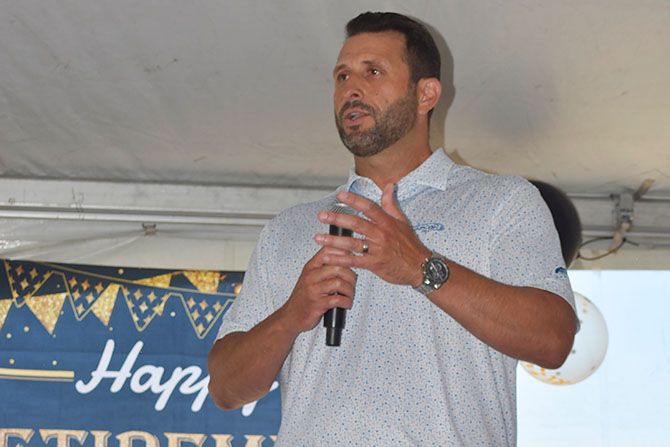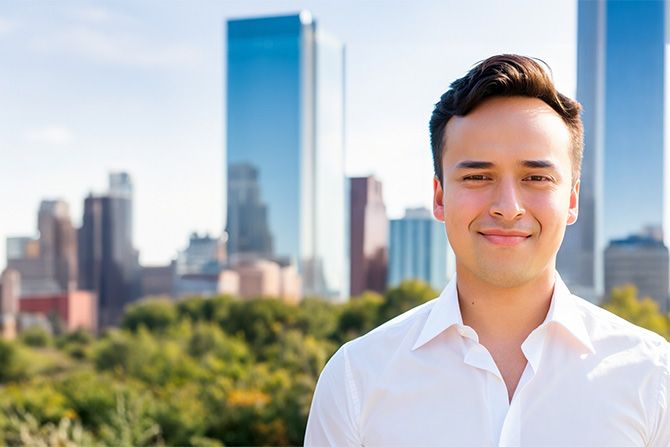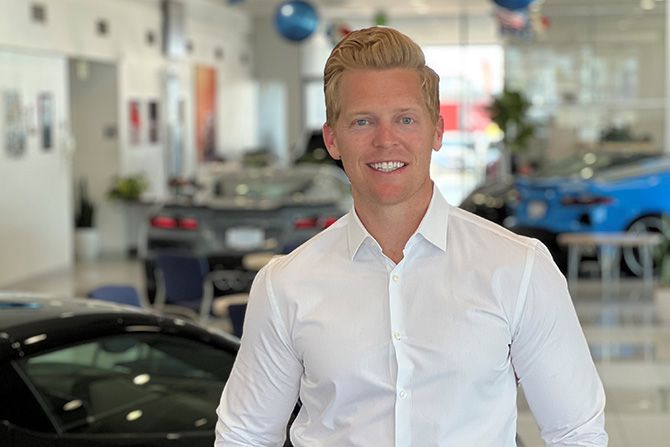John Dominic Segal’s life is nothing short of interesting; it’s almost like he was destined to be in the auto industry from the day he was born. His parents first met at a dealership. His dad, John Walter Segal, was the sales manager, and his mom, Teri, was the customer who ended up purchasing a car. The next day, Teri came into the dealership to take delivery of her new car, and John Walter decided to come in on his day off just to ask her out. About seven months later, the two were married. The couple welcomed their first son, John Dominic, one year later.
He grew up watching his dad rise through the ranks of the industry. “I still remember going to the dealership with my dad; while he worked, I played on the showroom floor,” he recalled. “I learned a lot from him over the years.” At 13 years old, John would often help around the dealership as a detailer, a lot attendant and a fence painter when needed. His pay was his dad buying him lunch and spending quality time over a meal.
While attending Bellarmine College Prep, a Jesuit high school in San Jose, he continued to work for his father at the dealership until he left for college at San Diego State University.
While college was out for summer break, John sold cars for his dad, a general manager at the time. “I would sell cars during the summers so that I could return to college with some spending money,” he said. He graduated from San Diego State University with a bachelor’s degree in communications.
Around that time, his father became a partner in a dealership, and the two planned on working together. Unfortunately, his father was involved in an accident and passed away a few months later. The decision was made to sell the partnership back, so his mother did not have to work. John went to work with a different auto group.
The lessons he learned growing up and his father’s good example served him well. Today, John is the general manager of Kearny Mesa Ford and Kearny Mesa Kia in San Diego. He is also just beginning his term as the 2024-2025 chairman of the New Care Dealers Association San Diego County (NCDA).
We recently had a chance to sit down and talk with John about his thoughts on life, his chairmanship and the industry. The following are excerpts from our conversation.
Do you have a favorite quote?
“That which does not kill us makes us stronger” is my favorite quote. Ironically, it fits our industry well because we are very resilient. Sometimes situations knock us off course — like COVID or the recent cyberattack — but we as dealers adapt, learn, grow and become stronger from these experiences.
At this point, the industry is very prepared for another pandemic. But for many, including my dealership group, this is the first time being involved in a cyberattack. There is nothing I can do to get us out of this mess. The only thing I can do is to control the controllable. As a leader, I can keep a positive mental attitude with the team, show up and work through this alongside them and with them instead of telling them what to do. In short, lead by example.
What are the two or three most significant issues facing the auto industry?
Cyberattacks are definitely at the top of my list based on our most recent experience. High interest rates for both customers purchasing vehicles and dealership flooring are also a problem. Additionally, coming out of COVID manufacturers aren’t entirely building cars at full speed yet, so managing inventory can be challenging at times.
Another big issue is EV pricing, servicing and facility improvements, which have been very costly. Many dealers have put up EV chargers, and it is sometimes a struggle to find someone to fix them when they are down. There are also several unanswered questions: Are we going to hold the power grid, and are we going to have as much power as we need based on what we know about the fast charge and the slower charge? Also, will we have the needed infrastructure on site for the facility to keep up with the demand as we progress through EV sales? We need to work closely with our OEMs to address this.
Why is the franchise system still the best way to sell cars?
The franchise system creates competition amongst dealers, allowing the customers to get the best deal possible. It also leaves customers with the choice of who they want to do business with. Another piece of why the franchise system is good for the community is the dealers’ relationships with local businesses and charities. Our industry, on the whole, does a lot of goodwill and charity work that we don’t talk about because we are not looking for accolades. We do it out of the kindness of our hearts and because we enjoy being a part of the communities we work and live in.
How will the industry change in the next 3-5 years?
I think we may see a clearer direction from both local and state officials on EV growth as a percentage of our overall sales — we need to continue to work with our OEMs and the government to come up with a realistic timetable. I also see the EV range getting longer, alleviating the anxiety that many consumers have. Lastly, cars are becoming very technologically advanced; they’re making leaps and bounds every year and show no signs of stopping.
How long have you been an NCDA member, and why did you get involved in the association?
Our store has been an NCDA member for decades, but about four years ago, right after COVID started, a peer within my auto group told me that serving on the NCDA board was a great way to get to know local government officials and other local dealers and collaborate.
When I joined, we were holding regular Zoom calls due to the pandemic, and I was pleasantly surprised at how everyone was working together, discussing how they were handling certain situations. I learned a lot, especially when it came to the political/government aspect of trying to have our voices heard as dealers. NCDA has a fantastic board that does an amazing job of bringing issues to members’ attention. It was a big eye-opener for me.
What do you see as the benefit of being an NCDA member?
The opportunity to collaborate and network amongst peers is invaluable, as well as the association’s efforts to have constant and clear communication with members. NCDA does a great job of being innovative in an industry that’s constantly changing and morphing.
We can’t fix every problem by ourselves. When you have a group of people that have been through hard events — like cyberattacks and COVID — talking about what others are doing to find solutions brings a lot of great ideas to the table on how to handle issues. When we come together as a whole dealer body, we are strong, and NCDA is always there to support us.
What are your goals as chairman?
I want to continue lines of open communication with government officials to make sure our voice is heard here in San Diego, especially as we navigate through volatile market conditions and a changing industry.
It is a top priority to make sure the auto show is a success. We want our auto show to be as robust as possible to provide our customers and people in the market the best possible opportunity to see, touch, feel and get the whole experience of the vehicles we sell, not just see it on a commercial.
The data verifying the considerable influence that our show has on consumer purchase decisions is incredible, and revenue from the show ensures that NCDA can maintain our valuable member benefits for many years to come.
What help do you need from members to accomplish those goals?
I hope that board members continue to have open minds and are willing to change and adapt with new, fresh ideas. The board is made up of a great, eclectic group of people from all different backgrounds. Everyone adds value in a different way.
I encourage members to support the auto show in addition to the many events NCDA puts on, like job fairs. Members should not hesitate to pick up the phone to either call me or Scott Webb, our president, with ideas or suggestions. We are always happy to hear from our dealers.
Have you had any mentors? What did you learn from them?
My father was amazing at connecting with his employees and making them feel like family, regardless of how big the dealership was. I try to follow his example.
I walk the dealership minimally two to three times a day to make sure I say “Hi” to the employees. Without fail, every single walk I take, I get something new from it. I might ask, “Hey, what’s this doing here?” or an employee asks, “Do you have a minute?” and expresses their anxiety about an issue they might be having. I want to make sure they know that they are valued and supported.
When you mentor others, what are three pieces of advice you would share?
- Lead by example. Don’t tell others what to do; show them what to do.
- The only easy way is the hard way. Shortcuts don’t exist.
- When it’s time to make a decision, always do the right thing for your employees and your customers. Bottom line, if you don’t know the answer, go with your gut.
What career accomplishment are you proudest of?
Professionally, watching those I’ve mentored achieve career milestones is my greatest accomplishment. Seeing an employee buy their first car or home or have a child is really neat. I take pride in knowing I was a part of something that helped them.
Personally, I had a goal of being a GM partner at age 40. I was able to achieve that at age 32. That was a big goal and I could not have achieved it without help from so many great teammates and peers.
Tell us about your family and hobbies.
My wife, Marcella, and I have two children: a 12-year-old daughter and an 8-year-old son. When I’m not working, I enjoy boating with my family, watching my kids play sports and golfing.
Any last thoughts?
Working hard is important, but who you help and mentor along the way matters most because no one can do it alone. Be open to help. If you’re trying to shoulder everything yourself, you’re not going to get to where you need to be as easily or as quickly as you might think.








